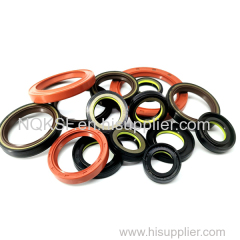
Wholesale High Quality Oil Seal Durable Different types Oil Seal
| Min. Order: | 500 Piece/Pieces |
|---|---|
| Trade Term: | EXW |
| Payment Terms: | L/C, D/P, D/A, T/T, WU |
| Supply Ability: | 10000000 |
| Place of Origin: | Hebei |
Company Profile
| Location: | Xingtai, Hebei, China (Mainland) |
|---|---|
| Business Type: | Manufacturer |
Product Detail
| Means of Transport: | Ocean, Air, Land |
|---|---|
| Standard or Nonstandard: | Standard |
| Style: | Others |
| Material: | Rubber |
| Brand Name: | nqksf |
| Application: | Industrial bearing, Pump Hydraulic Machine Rotary Shaft |
| Feature: | Oil/ Heat/ High Pressure Resistance, Durable |
| MOQ: | 10 PCS |
| Production Capacity: | 10000000 |
| Packing: | 10 pcs/ 1 paper scroll |
| Delivery Date: | 7-15 |
Product Description
In the complex world of machinery maintenance, oil seals play a pivotal role in ensuring operational efficiency. Selecting the correct type of oil seal can significantly influence the performance and durability of mechanical systems. This article explores various oil seal types and provides insights on making the best selection for your needs.
The Role of Oil Seals
Oil seals are essential components used to protect bearings and other rotating elements from contaminants while retaining lubricants. They are critical in preventing leaks and ensuring that machinery operates smoothly without excessive wear and tear.
Exploring Common Oil Seal Types
1. Single Lip Oil Seals
Characteristics: One lip that contacts the shaft.
Uses: Best for low-contamination environments.
Advantages: Cost-effective, easy to install, and adequate for many general-purpose applications.
2. Double Lip Oil Seals
Characteristics: One main sealing lip and an auxiliary lip.
Uses: Ideal for areas with significant dust and dirt.
Advantages: Enhanced sealing, extended service life, additional protection against contaminants.
3. PTFE Oil Seals
Characteristics: Constructed from PTFE, known for its unique properties.
Uses: Suitable for high-temperature and chemically harsh environments.
Advantages: High chemical resistance, low friction, suitable for dynamic applications.
4. Metal Case Oil Seals
Characteristics: Incorporate a metal casing for added support.
Uses: Designed for heavy-duty applications.
Advantages: Increased structural integrity, better performance under pressure, prolonged lifespan.
When selecting an oil seal, several factors must be considered:
Environmental Conditions: Temperature extremes, exposure to chemicals, and contamination levels.
Material Compatibility: Ensuring the seal material is compatible with lubricants and chemicals it may contact.
Operational Speed: Higher shaft speeds require seals that can manage increased friction and thermal stresses.
Application Requirements: Specific demands of the application, including the type of machinery and its operating conditions.
Recent Developments in Oil Seal Technology
Innovations in material science and engineering have led to the development of advanced oil seals. These new seals offer improved durability, better performance, and reduced maintenance needs. For example, some seals now use composite materials that combine the best properties of different substances to provide superior sealing solutions.
Selecting the appropriate oil seal type is vital for maintaining the efficiency and longevity of machinery. By understanding the different types of oil seals and their specific applications, you can make informed decisions that enhance performance and reduce downtime. Whether dealing with high temperatures, chemical exposure, or demanding mechanical conditions, there is an oil seal designed to meet those challenges.

